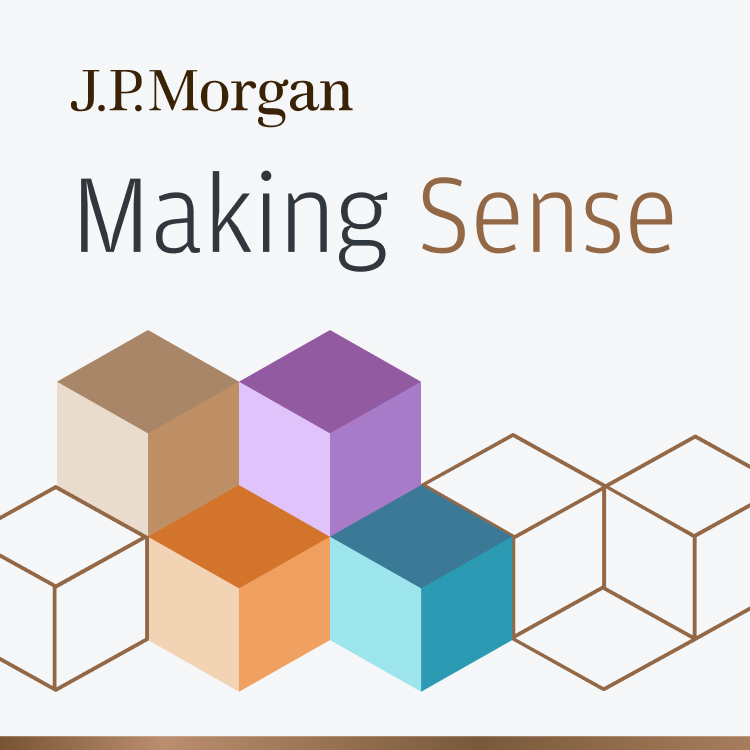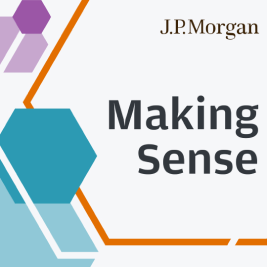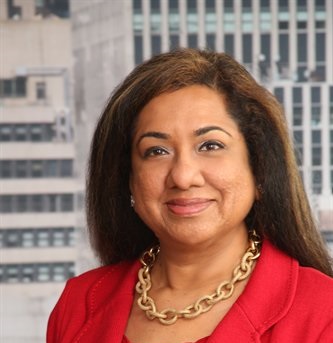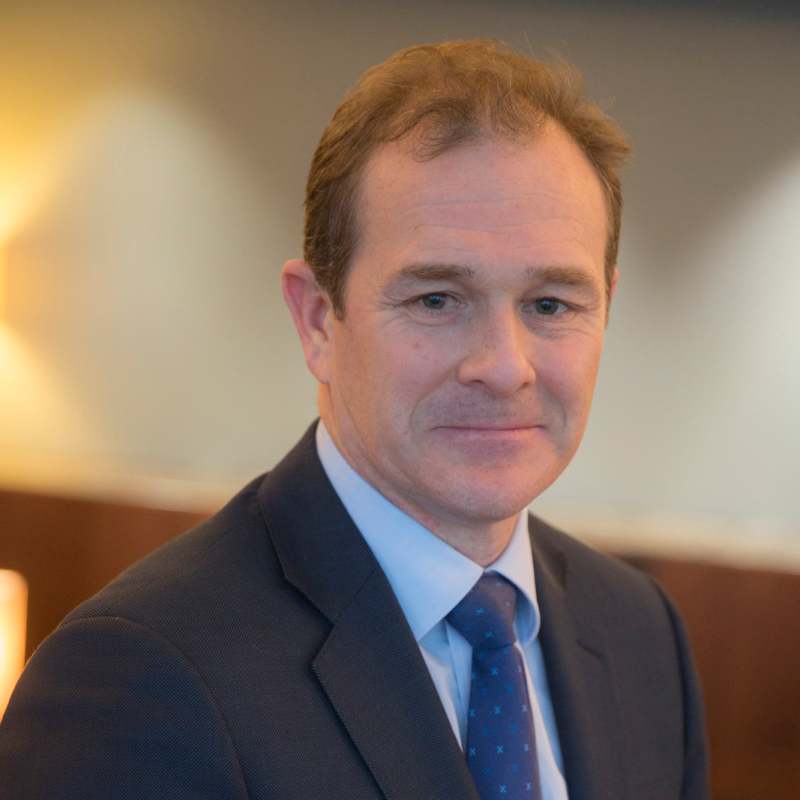Investment Banking
Investment Banking outlooks and insights
J.P. Morgan is committed to providing insights into investment banking and the wider world of finance, economics and markets. Coverage spans industry sectors and product groups including healthcare, technology, M&A, shareholder engagement and more.

2024 Investment Banking Outlook

The state of innovation in a volatile market
How are companies supporting innovation in the health care industry, and what does the future hold?
The state of innovation in a volatile market
How are companies supporting innovation in the health care industry, and what does the future hold?Healthcare Symposium
Vis Raghavan: A very warm welcome to this, our inaugural innovation symposium in the health care space. It's absolutely fantastic that you can all kind of join us here today.
Dania Chehab: There is quite a lot of innovation coming from health care. And this really permeates across all subsectors, be it cutting edge R&D in biotech, genetic sequencing, and life science tools and diagnostic-- the consumerization of health care, which we have seen accelerate over the last couple of years.
Jeremy Hunt: Life sciences is one that we are particularly proud of, not just because we are home to a third of the European life science startups, but because we can see the impact on ordinary families of what happens when you have a strong life science sector.
Christian Wolfum: We have a growing, but also aging population. There's a strong need for more and more precise medicine. And life science companies help there a lot. The life science industry, it's an industry where you have partners from corporate, academia providers. You can really create an ecosystem of open innovation, bringing new ideas into your company, really seeing what will impact health care and the clinical practice in a couple of years from now.
Rose Nguyen: Over the past 5 to 10 years, there has been tremendous progress in the field in some areas that even exceeded our expectations. We believe that there is a technological revolution going on in health care and life sciences.
Shobi Khan: There's so much innovation going on. And I think to be in that space now, to be able to participate in those discoveries is an extraordinary opportunity.
David Redfern: We feel very optimistic about the level of science. There's a lot of great innovation happening, a lot of great science happening. It is being accelerated by the tech revolution. And the interface of data science with biological and genetic science is hugely exciting.
Juha Anjala: We support innovation in many different ways. We have always been willing to invest early in a relationship with innovators. We are a relationship-based organization that invests in our clients early, consistently, and over time.
David Ke: I'm very excited by a number of the strong innovations that we have coming out of the health care sector. For example, whether it's the latest cutting edge science coming out of biotechnology. It's been unique and remarkable to see just the globalization within the health care industry over the past decade, whether it's European companies that want to list in the U.S., but also attract capital from Asia, or Asia companies thinking about listing in London, but also wanting to attract U.S. investors.
Chris Hollowood: We're incredibly lucky relative to some other industries, where clearly you need to create value for shareholders, but also you create value for so many other stakeholders. At the scientific level translating world-beating science into medicines, then at the medicine level when you see the impact on patients. And the wonderful thing is actually when you serve all three, all three have the greatest success. So there's an alignment there. So if you can't get out of bed in the morning energized by all of that, I don't know what you can.
Fred Turpin: There’s been an extraordinarily challenging backdrop. It's harder to get deals done today than it used to be. Rates are higher, equity markets are less forgiving, but there is no shortage of strategic activity. Everything we thought about meeting communications valuations for course segments over the last three or four years has changed. So what's driving some of these changes? Obviously, the economics of streaming are very different than the economics of linear content on cable.
Fred Turpin:And I do think that it seems self-evident that over the next five years we're going to see reductions in content spending, more consolidation and probably higher prices for all of us to watch Yellowstone and Succession.
Fred Turpin: Another area that we're very focused on our practice is audio. There's a lot more opportunity to grow, share and to advertise more effectively on audio right now than there may be on video, because it's video is just kind of overwhelmed with high quality content and competitors. Gaming has exploded and the community that is very focused on gaming as a form of entertainment are also very active online.
Fred Turpin: And it makes them very, very attractive and important consumers for leading edge technology companies. There is a scramble to try to make sure that platforms have access to those really important, incredibly dedicated and high intensity users. And gaming is often a platform for that.
Fred Turpin: One of the biggest changes we've seen over the last three years since COVID has been in consumer broadband. We saw valuations hit all time highs for cable companies and for certain wireless companies. Since the pandemic ended, and the technology cost of deploying very high quality broadband has is dramatically less than it was five years ago. So we've seen competition come into a number of these markets and it's become a much more dynamic marketplace where for 20 years, basically cable companies had home broadband to themselves.
Fred Turpin: We do continue to see growth in fiber to the home. There's a half a dozen players that are driving that very capital intensive. But these are 50 year assets.
Fred Turpin: The market cap that has been created in the tower sector, in the data center sector, as well as the fiber sector over the last ten years is is dramatic. Right. And while it's down from the peaks, it's certainly still amazingly value creating for both the companies and the investors that have been early to the space. We continue to believe that we're in the early innings, third, fourth inning of the total architecture of the digital infrastructure for the United States and then subsequently the world demand for advanced devices, Internet connected devices and data creation continue to explode, whether it's storage, connectivity, compute latency.
Fred Turpin: These trends are here with us to stay. If your sovereign wealth fund, if you're a major PE fund, if you've got a dedicated infrastructure fund, how are you not a participant in the datacenter sector, in the cloud sector, in the tower sector, in the DAS sector, in fiber, like every zero sum game, there are going to be winners and they're going to be losers and boardrooms and CEOs and management teams across America and the world are very, very focused right now in my sector, I'm trying to make sure that they're putting the pieces in place to ensure that they have competitive advantage in a consumer facing business in the future that’s going to allow them to create value.
END
Chris Grose: The future today, in my opinion, is as bright as it’s ever been. TMC is going to continue to be the engine for the U.S. economy. Now on the M&A side, companies remain cautious given the macro uncertainty. What’s the one lone bright spot? It’s been sponsor activity. So we’ve seen a good amount of take privates and we expect to see more. And the debt markets has just been, frankly, more resilient than the equity markets. And we expect a relatively healthy financing backdrop to support M&A going forward.
END
Capabilities in Investment Banking
Within investment banking, the firm works with a broad range of issuer clients, including high growth companies, corporations, institutions and governments, to deliver comprehensive strategic advice, capital raising and risk management expertise that match their scale and needs.
The Corporate Advisory & Sustainable Solutions (CASS) team is committed to helping clients accelerate and amplify their impact in the global economy, while navigating the shifting industrial policy and accelerating the trend towards sustainability and decarbonization. CASS offers clients holistic advice, capital markets solutions and targeted capital deployment, partnering with coverage and product teams across businesses and functions, including the Corporate & Investment Bank, Commercial Banking and global Corporate Sustainability. Providing strategic advisory and expertise to a global client base, the team is organized around these focused solutions:
- Corporate finance:
Work with clients to provide structuring, ratings and capital structure advisory.
Learn more:
- Sustainability:
Provide clients with sustainability-focused financing, insights and advisory solutions. Read more:
- Infrastructure:
Help clients to structure and execute complex infrastructure transactions across investment banking and markets businesses
Corporate Derivatives Marketing (CDM) provides risk management and structured financing solutions for J.P.Morgan’s corporate clients. Part of the Global Markets organization, CDM works closely with investment banking teams to develop relevant solutions & products. Clients benefit from our areas of expertise including:
- Risk management in M&A transactions
- Monetization and hedging of single stock positions
- Commodities hedging and financing
- FX and interest rate risk management
In-depth, industry-specific expertise and regional market acumen: this is how J.P. Morgan’s industry coverage teams serve the evolving needs of global clients across a broad range of sectors, including:
- Consumer retail
- Energy and infrastructure
- Financial institutions
- Financial investors
- Healthcare
- Industrials
- Media and communications
- Public sector
- Real estate
- Technology
Our leadership
J.P. Morgan’s Investment Banking group is driven by industry leaders with deep expertise. Hear from key executives who shape deal-making across the investment banking industry.
Solutions for
our clients
J.P. Morgan’s greatest asset is the breadth and depth of its client base. The firm’s approach to serving clients has always centered on doing first-class business in a first-class way. Striving to build trusted, long-term partnerships, J.P. Morgan takes a holistic and forward-looking view of relationships, identifying ways to help clients accomplish their most important business objectives.
The clean tech of the future
See highlights from our Clean Tech Stars conference, which brought together 30 of the most exciting, successful, high-growth companies helping to make net zero happen.
The clean tech of the future
See highlights from our Clean Tech Stars conference, which brought together 30 of the most exciting, successful, high-growth companies helping to make net zero happen.
James Janoskey: What do we mean by Clean Tech Stars? To us, these are the companies that are leading to find solutions and technologies that are required for the world to address our net-zero commitment by 2050. That these companies are the ones that are purely focused on finding solutions through new technologies, new capabilities, new partnerships to address this challenge.
Karl Atenburg: To master the challenge and to get these companies to industrial scale and these clean tech solutions to an industrial operating efficiency, we need a lot of capital. So banks and capital markets are obviously crucial to help raise that capital.
Chuka Umunna: We've brought together 30 of the most exciting, most successful high-growth companies across the different green economy verticals who’ve raised around $7 billion in aggregate over the last few years. Our role here is very important here as a bank because they won’t be able to do what they need to do without raising the finance necessary and we’re committed to financing and facilitating $2.5 trillion to delivery against the UN’s sustainable development to 2030, with a trillion of that focused on the green economy.
Sydney Locksley: So, when we think about the importance of green and sustainable financing, not all financial instruments fall under this green label, but the really rapid growth in green investing, such as in green bonds or in SLBs, demonstrates an appetite to shift capital towards clean investment. And with support for additional clean and sustainable investment, we can reorient cashflows towards clean investments and have this reciprocal benefit bode for investors as well as for the clean energy companies that require this intensive capital inflow to scale and grow the businesses.
Alberto Piana: This is not a slogan anymore. The carbonization net zero company really have to take action and they are taking action. And there’s a reality: all the company who’re here today with us are enabling the transformation to happen. So that’s why it’s so important that we identify company that would be the future leader in this transition towards the net zero and the carbonization economy.
Careers in
Investment Banking
Investment banking is a unique, challenging and rewarding career path. Working to facilitate capital funding across various industries and markets, investment bankers will advise clients and execute transactions with care and precision.
Hear about investment banking careers from our executives
Some J.P. Morgan products and services may not be available in certain regions. Please consult your J.P. Morgan representative to learn more about the products and services available to you.
This material (including market commentary, market data, observations or the like) has been prepared by personnel in the Investment Banking Group of JPMorgan Chase & Co. It has not been reviewed, endorsed or otherwise approved by, and is not a work product of, any research department of JPMorgan Chase & Co. and/or its affiliates (“J.P. Morgan”).
Any views or opinions expressed herein are solely those of the individual authors and may differ from the views and opinions expressed by other departments or divisions of J.P. Morgan. This material is for the general information of our clients only and is a “solicitation” only as that term is used within CFTC Rule 1.71 and 23.605 promulgated under the U.S. Commodity Exchange Act.
RESTRICTED DISTRIBUTION: This material is distributed by the relevant J.P. Morgan entities that possess the necessary licenses to distribute the material in the respective countries. This material is proprietary and confidential to J.P. Morgan and is for your personal use only. Any distribution, copy, reprints and/or forward to others is strictly prohibited.
This material is intended merely to highlight market developments and is not intended to be comprehensive and does not constitute investment, legal or tax advice, nor does it constitute an offer or solicitation for the purchase or sale of any financial instrument or a recommendation for any investment product or strategy.
Information contained in this material has been obtained from sources believed to be reliable but no representation or warranty is made by J.P. Morgan as to the quality, completeness, accuracy, fitness for a particular purpose or noninfringement of such information. In no event shall J.P. Morgan be liable (whether in contract, tort, equity or otherwise) for any use by any party of, for any decision made or action taken by any party in reliance upon, or for any inaccuracies or errors in, or omissions from, the information contained herein and such information may not be relied upon by you in evaluating the merits of participating in any transaction. All information contained herein is as of the date referenced and is subject to change without notice. All market statistics are based on announced transactions. Numbers in various tables may not sum due to rounding.
J.P. Morgan may have positions (long or short), effect transactions, or make markets in securities or financial instruments mentioned herein (or options with respect thereto), or provide advice or loans to, or participate in the underwriting or restructuring of the obligations of, issuers mentioned herein. All transactions presented herein are for illustration purposes only. J.P. Morgan does not make representations or warranties as to the legal, tax, credit, or accounting treatment of any such transactions, or any other effects similar transactions may have on you or your affiliates. You should consult with your own advisors as to such matters.
The use of any third-party trademarks or brand names is for informational purposes only and does not imply an endorsement by JPMorgan Chase & Co. or that such trademark owner has authorized JPMorgan Chase & Co. to promote its products or services.
J.P. Morgan is the marketing name for the investment banking activities of JPMorgan Chase Bank, N.A., J.P. Morgan Securities LLC (member, NYSE), J.P. Morgan Securities plc (authorized by the Prudential Regulation Authority and regulated by the Financial Conduct Authority and the Prudential Regulation Authority), J.P. Morgan SE (Authorised as a credit institution by the Federal Financial Supervisory Authority (Bundesanstalt für Finanzdienstleistungsaufsicht, BaFin) and jointly supervised by the BaFin, the German Central Bank (Deutsche Bundesbank) and the European Central Bank (ECB)), J.P. Morgan Securities Australia Limited (ABN 61 003 245 234/AFS Licence No: 238066 and regulated by Australian Securities and Investments Commission) and their investment banking affiliates. J.P. Morgan Securities plc is exempt from the licensing provisions of the Financial and Intermediary Services Act, 2002 (South Africa).
For Brazil: Ombudsman J.P. Morgan: 0800-7700847 / ouvidoria.jp.morgan@jpmorgan.com
For Australia: This material is issued and distributed by J.P. Morgan Securities Australia Limited (ABN 61 003 245 234/ AFS Licence No: 238066) (regulated by ASIC) for the benefit of “wholesale clients” only. This material does not take into account the specific investment objectives, financial situation or particular needs of the recipient. The recipient of this material must not distribute it to any third party or outside Australia without the prior written consent of J.P. Morgan Securities Australia Limited.























